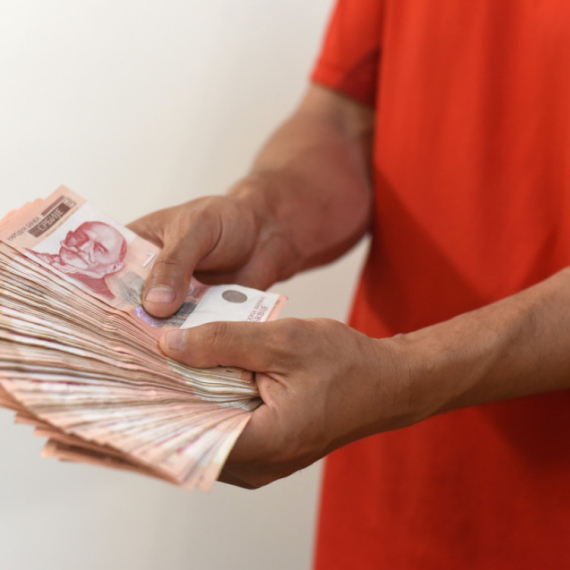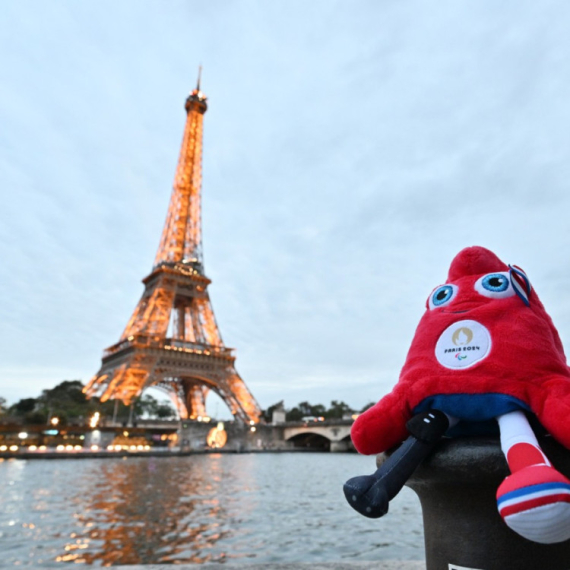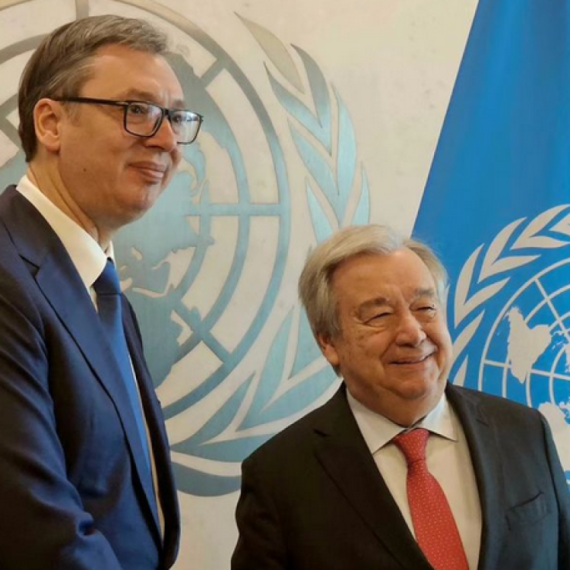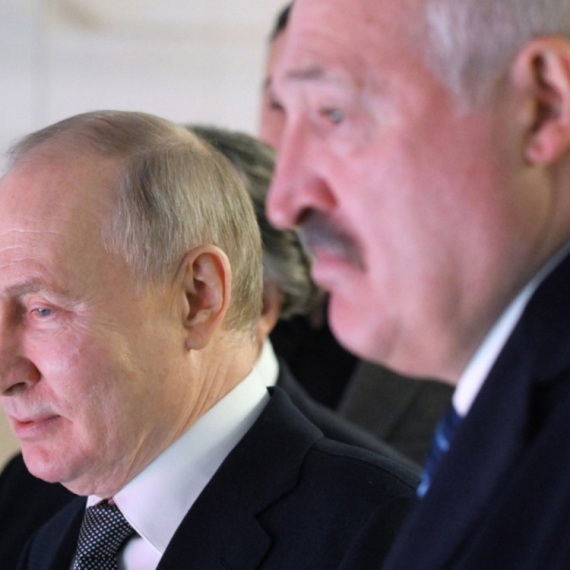Macedonian ambassador expelled too
The Macedonian ambassador has joined his Montenegrin counterpart on the list of personae non gratae in Serbia, a day after the two countries recognized Kosovo
Friday, 10.10.2008.
09:34

The Macedonian ambassador has joined his Montenegrin counterpart on the list of personae non gratae in Serbia, a day after the two countries recognized Kosovo Earlier, Serbian government responded by expelling Montenegrin Ambassador Anka Vojvodic, and today it has done likewise to Aleksandar Vasilevski, Beta learns from the Macedonian embassy. Macedonian ambassador expelled too Montenegro and Macedonia’s decision to recognize Kosovo last night was the result of an exhausted political appraisal, and the two countries remain committed to further enhancing and extending relations with Serbia, reads a joint statement from the two countries. A statement published on the Montenegrin government’s website states that the two countries support the building of democratic institutions in Kosovo, with a view to building a multi-ethnic society where the rights of all ethnic communities and their cultural, religious and lingual identity will be guaranteed. “Montenegro and Macedonia, guided by core principles of their foreign policy for building good-neighborly relations with all their neighbors remain committed to further development and deepening of relations with the Republic of Serbia in all areas of common interest, as well as to maintaining traditional close ties among the three countries and their peoples. At the same time, the two countries will continue to render support the Republic of Serbia on its way to European integration,” the statement reads. “In this sense, Montenegro and Macedonia will strive for improvement of regional cooperation institutionalized through regional initiatives as well as for full implementation of the free flow of people, goods, capital and ideas,” it adds. The joint statement by the two governments was published in Montenegrin, Macedonian and English languages. The recognitions come just a day after the UN General Assembly decided to refer the issue of the legality of Kosovo’s unilateral independence declaration to the International Court of Justice (ICJ). In the wake of Podgorica’s decision, the Serbian government reacted abruptly and expelled the Montenegrin ambassador. That is the first time that an ambassador of a country recognizing Kosovo has been expelled. Foreign Minister Vuk Jeremic told B92 that the reason why Belgrade took that step was “the fact that the decision of the regime in Podgorica came after the vote at the General Assembly.” “Countries that have not thus far recognized Kosovo, now, after the ICJ has begun to consider that issue, have absolutely no reason to do so, other than to prejudice the court’s final verdict,” said Jeremic. The minister said that Serbia would continue to apply harsh measures as it believes that there is no reason to recognize the province’s independence at a time when the ICJ is considering the case. On Thursday night, the Montenegrin ambassador stated that Serbia’s decision that she should leave the country within 48 hours “isn’t a clever or good political move”. “I’ve been delivered a note, according to which, based on the provisions of the Vienna Convention, I’ve been declared a persona non grata, and been given 48 hours to leave the country,” said Vojvodic. The government took the decision to return ambassadors to all countries from which they had been recalled for consultations in Belgrade in order to continue diplomatic activities with a view to preserving Serbia’s sovereignty and territorial integrity. President Boris Tadic told FoNet that the UN’s decision was a triumph for Serbian foreign policy, which returned Serbia to the forefront of international relations. He said that Serbia had regained friends that she had once forgotten, first and foremost, from the Non-Aligned Movement and Third World countries. Macedonian Ambassador Aleksandar Vasilevski on his arrival in Serbia (FoNet, archive)
Macedonian ambassador expelled too
Montenegro and Macedonia’s decision to recognize Kosovo last night was the result of an exhausted political appraisal, and the two countries remain committed to further enhancing and extending relations with Serbia, reads a joint statement from the two countries.A statement published on the Montenegrin government’s website states that the two countries support the building of democratic institutions in Kosovo, with a view to building a multi-ethnic society where the rights of all ethnic communities and their cultural, religious and lingual identity will be guaranteed.
“Montenegro and Macedonia, guided by core principles of their foreign policy for building good-neighborly relations with all their neighbors remain committed to further development and deepening of relations with the Republic of Serbia in all areas of common interest, as well as to maintaining traditional close ties among the three countries and their peoples. At the same time, the two countries will continue to render support the Republic of Serbia on its way to European integration,” the statement reads.
“In this sense, Montenegro and Macedonia will strive for improvement of regional cooperation institutionalized through regional initiatives as well as for full implementation of the free flow of people, goods, capital and ideas,” it adds.
The joint statement by the two governments was published in Montenegrin, Macedonian and English languages.
The recognitions come just a day after the UN General Assembly decided to refer the issue of the legality of Kosovo’s unilateral independence declaration to the International Court of Justice (ICJ).
In the wake of Podgorica’s decision, the Serbian government reacted abruptly and expelled the Montenegrin ambassador. That is the first time that an ambassador of a country recognizing Kosovo has been expelled.
Foreign Minister Vuk Jeremić told B92 that the reason why Belgrade took that step was “the fact that the decision of the regime in Podgorica came after the vote at the General Assembly.”
“Countries that have not thus far recognized Kosovo, now, after the ICJ has begun to consider that issue, have absolutely no reason to do so, other than to prejudice the court’s final verdict,” said Jeremić.
The minister said that Serbia would continue to apply harsh measures as it believes that there is no reason to recognize the province’s independence at a time when the ICJ is considering the case.
On Thursday night, the Montenegrin ambassador stated that Serbia’s decision that she should leave the country within 48 hours “isn’t a clever or good political move”.
“I’ve been delivered a note, according to which, based on the provisions of the Vienna Convention, I’ve been declared a persona non grata, and been given 48 hours to leave the country,” said Vojvodić.
The government took the decision to return ambassadors to all countries from which they had been recalled for consultations in Belgrade in order to continue diplomatic activities with a view to preserving Serbia’s sovereignty and territorial integrity.
President Boris Tadić told FoNet that the UN’s decision was a triumph for Serbian foreign policy, which returned Serbia to the forefront of international relations.
He said that Serbia had regained friends that she had once forgotten, first and foremost, from the Non-Aligned Movement and Third World countries.




















Komentari 52
Pogledaj komentare